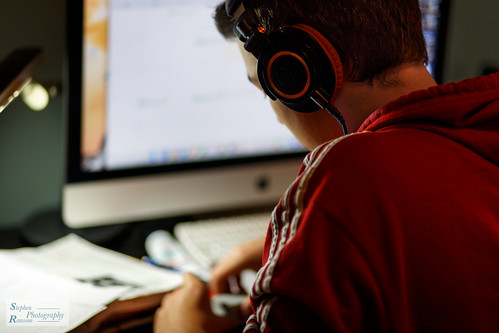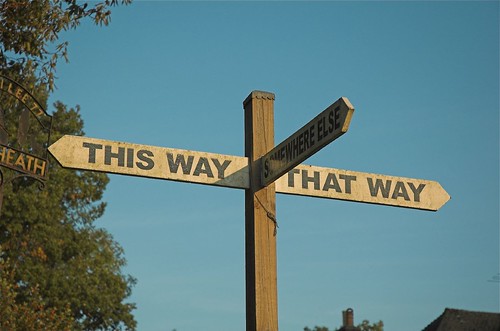At this time of year my news feeds dry up as most people in the business take their summer break so maybe it's a good time for me to take stock and reflect on the status of online learning today and speculate on future developments. I've been working with online learning for around twelve years now and whilst there has indeed been significant progress in some aspects we still get bogged down in the same discussions and preconceptions as we did when I started in 2004. Here's a list of recurring themes on this blog that I'm really getting tired of discussing (in no particular order).
Polarised either /or discussions
We are still trapped in endless discussions about whether online education is better or worse than traditional classroom education or whether e-books are better than print and so on. These discussions seldom lead anywhere except further entrenchment.
Tony Bates outlines a much better approach in his current series of blog posts on online learning, see for example
Online learning for beginners: 2. Isn’t online learning worse than face-to-face teaching? Most comparisons fail to compare like with like (ie same types of students with similar needs) and seldom see that the two modes suit different types of learners (young full-time campus students and older lifelong learners). The eternal debate on completion rates ignores the fact that distance learners have completely different life situations compared to full-time campus students who generally complete their courses regardless of the quality, simply because their funding depends on them passing. Generally these types of comparisons ask the wrong questions, see more below.
Traditional education as default
The burden of proof is overwhelmingly on the online side whilst few people investigate whether traditional methods really work as well as we think. Are classrooms always the best place for an open discussion when we know so well that these discussions favour those who like the spotlight and those who like to reflect before answering and feel intimidated in a group setting never say anything? Lectures have been central to higher education for centuries but does that mean that we learn from them? What types of learning do we test in exam halls? I would like to see an end to the burden of proof syndrome and instead accept that we need to integrate face-to-face and online to offer more nuanced approaches to education.
Asking the wrong questions
The fact that we're still falling into the traps in the previous points means that we keep asking the wrong questions. It's not about delivery method, technical platform or old versus new it's about designing education that can reach out to and empower as many learners as possible using all the tools, methods and pedagogies available today (including the traditional ones!). Once again
Tony Bates offers two key questions for us to focus on:
Indeed, it is the variables or conditions for success that we should be examining, not just the technological delivery. In other words, we should be asking a question first posed by Wilbur Schramm as long ago as 1977:
What kinds of learning can different media best facilitate, and under what conditions?
In terms of making decisions then about mode of delivery, we should be asking, not which is the best method overall, but:
What are the most appropriate conditions for using face-to-face, blended or fully online learning respectively?
One size does not fit all and the traditional system has failed millions of learners by only offering face-to-face education often at a price and only in certain locations. How can we offer more inclusive and personalised education by using the full spectrum of tools and methods available today? Getting the mix right and focusing on course design are what we need to work on today.
"The next big thing" syndrome
Every time a new device, app or tool hits the market the hype machine revs into action and soon we're drowning in posts and articles on how Google Apps/MOOCs/iPads/Facebook Live/Pokemon go/xxxx will revolutionise education. The revolution isn't going to happen but they all contribute to an evolution. The problem is that the commercial hype only increases the skepticism of many educators and prevents them from investigating the new phenomena with an open mind. As a result new technologies and methods are restricted to an edtech echo-chamber and have limited impact to the mainstream. I would like to see less hype and fireworks and more genuine curiosity and investigation before we make any claims about revolutions or disruption.
Structural barriers and the power of tradition
Many who want to be innovative are stifled by structural barriers and tradition. The increasing focus on results and accountability stifles innovation as institutions play safe to avoid failure, The tyrany of rankings mean that you focus on the criteria that help you rise in the ranking system and ignore those that do not, ie research versus teaching, campus versus distance etc, The traditional image of the university as a leafy campus full of young full-time students and high profile research is extremely hard to break, as most university websites show. Pedagogical innovation, outreach and lifelong learning simply don't win any gold stars and until they do we seem to be stuck in a mold, even though there are, of course, exceptions.
Even students can be barriers to innovation. They have been brought up on the traditional image of the university and actually expect the lectures and student life that they have seen so much in films and TV series. A teacher who abandons the traditional methods and is innovative can risk poor evaluations from students who expect to be taught (ie lectured to).
Where do we go from here then? I don't see any radical changes in the near future but we need to get online into the mainstream and do it by asking new questions and simply not responding to either/or discussions. There are encouraging signs of a more integrated and nuanced aproach to online learning with several major international organisations taking the lead (UNESCO, OECD, European Commission, EUA and others). There are now many excellent reports, initiatives and funding schemes from these and other organisations and there are plenty of enthusiastic educators involved in projects. The barriers tend to appear in the space between these two extremes: governments, national authorities and educational leaders. For bottom-up to connect with top-down you need to work on getting the middle layers on board.



